Women in Economics
The Gender in the GES initiative promotes gender diversity in economics. We aim to increase female participation in economics in government and academia.
Documents
Details
About Us
What we are about
The work of economists in Government touches upon all aspects of life - from living standards and prosperity, an individual’s consumption choice to business growth and global trends spanning countries. This is why it is essential that the economists who provide advice for evidence-based policy making are representative of the society that the government serves. Diversity in our backgrounds leads to diversity of perspective with better approaches and more informed decisions.
The Government Economic Service (GES) is committed to upholding values that reflect the gender diversity of our society. We provide professional careers and opportunities, as well as a supportive community, for women in the field of economics. Our most recent initiative creates a vocal presence advocating for women in our profession through this webpage and our associated vlogs and blogs. We also welcome feedback on promoting non-gender conforming language.
News and Events
Women in Economics Virtual Careers Fair - 27 August 2020
The Gender in GES initiative is hosting a virtual careers fair on the 27 August. The aim is to promote opportunities available in the Government Economics Service to young women interested in pursuing a career in Economics. Attendees will have the opportunity to hear from a range of female economists through a panel discussion and question & answers session, followed by short talks from economists working in a range of departments.
Further details and the sign up link on Eventbrite can be found here
GES Careers Fair for Women in Economics - 26 September 2019
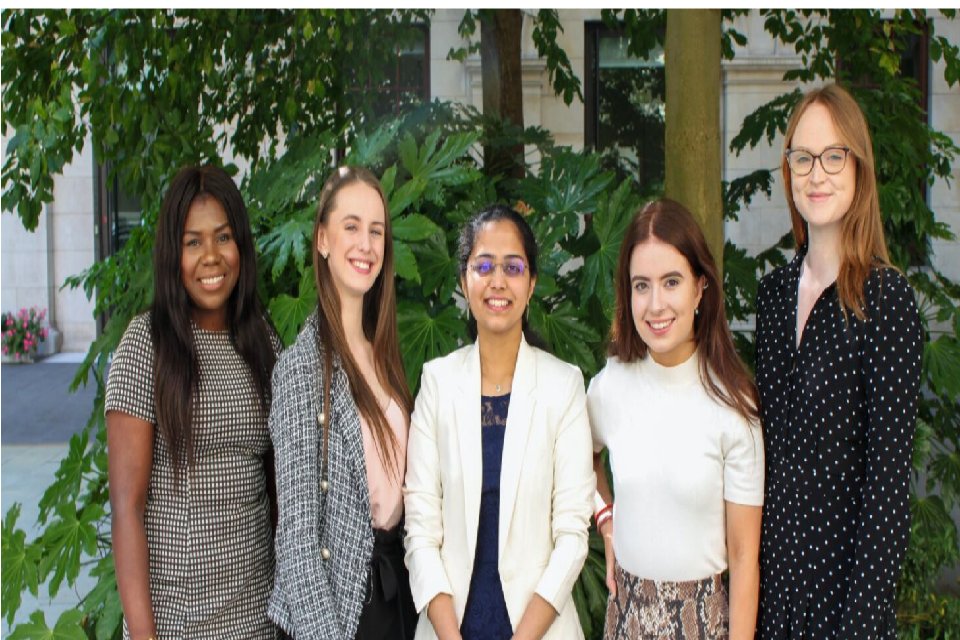
Careers Fair on 26 September 2019
The Gender in the GES workstream hosted a Careers Fair for young women who are interested in pursuing a career in Economics.
The day started a with a panel discussion where women shared their stories on their career paths, how they entered the Government Economic Service and the support they received along the way. One panel member shared a particularly inspiring story about a previous manager who encouraged her to apply for a promotion that she did not think she was qualified for. Studies have found that women are less likely than men to apply for jobs when they possess the same qualifications. This highlights the importance of support networks and role models in the workplace.
Attendants then had the opportunity to meet representatives from various Government Departments. Discussions followed whereby representatives showcased the work they had done and talked about the daily roles. Two students from Headington School attended the Careers Fair, see what they had to say here
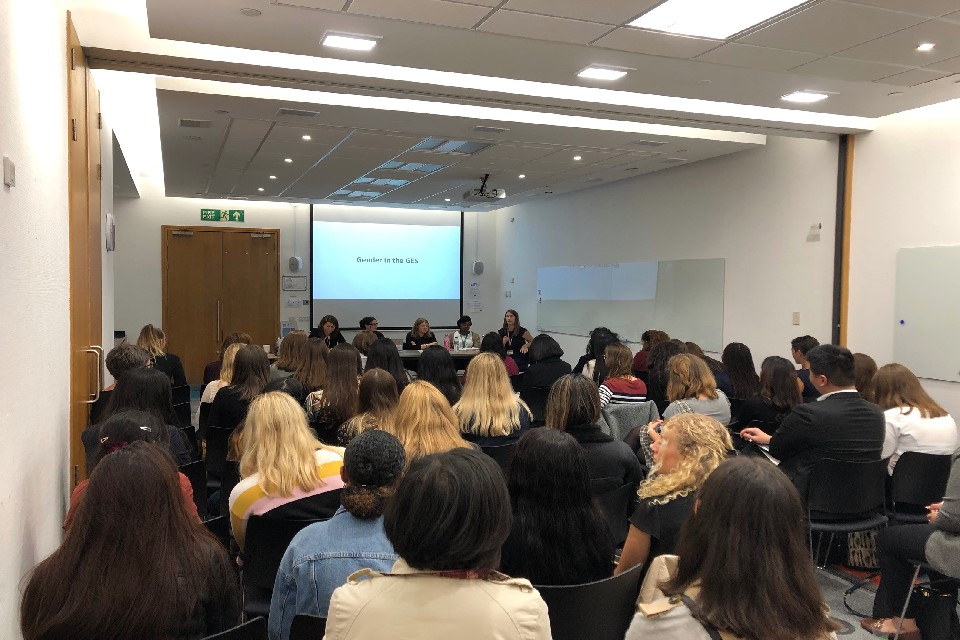
Panel discussion at the Careers Fair
GES mini-conference on inequalities – 3 July 2019
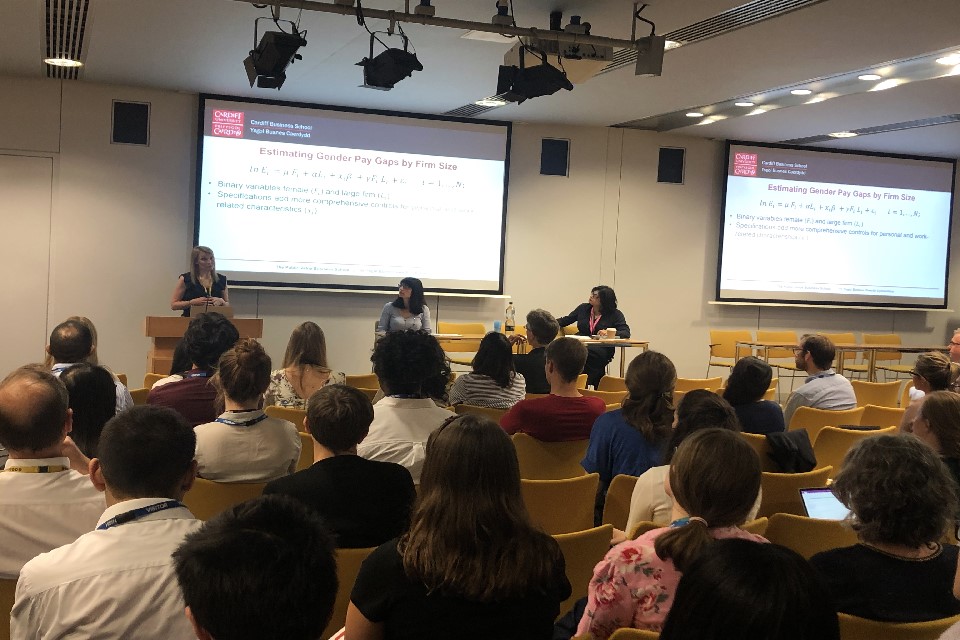
mini conference on 3 July 2019
Inequality takes many forms. Whilst the GES Women in Economics initiative is focused on gender disparities in our profession, we are acutely aware that there is a wider story here. This inaugural GES mini-conference, organised in partnership with Nuffield foundation, focused on various inequalities in the UK.
Discussion on inequalities are shaping today’s economic debate. OECD evidence is beginning to suggest that there are trade-offs and that inequality could be undermining growth although the relationship is complex. The Gini Coefficient isn’t enough to understand the winners and losers from prosperity or growth enhancing policies. We need to look beneath the surface and better understand the drivers that create inequalities in our societies and economies. A potential big win here is to make the teaching and practice of economics more pluralist in principle – bring in other disciplines, critique our models, explain and communicate to the wider public how and why inequality matters.
At this first mini-conference, we focused on some facets of inequality: gender, income and wealth and spatial inequalities.
-
Melanie Jones from Cardiff Business School told us that firm size does matter. The gender pay gap in the UK is narrowing but remains sizeable (at about 17%) in comparison to other EU countries. The pay gap is larger in large firms (over 250 employees) than in small firms. However, we don’t understand why, and we are unsure whether it is due to worker selection or features of the firms e.g. management practices, or both
-
John Hills from LSE demonstrated that high inequality without growth is very different from high inequality with growth. The ‘calm surface’ at population level masks substantial differences for particular groups. Since 2005, younger adults did far worse than older ones. So did the poorest lone parents, poorest Londoners, poorest 60-64s (and 80+), poorest social tenants and private tenants – although these groups do not map easily onto those usually said to be ‘left behind
-
Alasdair Rae from The University of Sheffield showed us extracts of a project aiming to build an English Atlas of inequalities. At a global level, income inequalities are very obvious. At a local level, they are less obvious, but can still be very significant, and surprising. Over the past decade or so we have seen a growing consensus that inequality is a problem that needs to be tackled but it will require new tools to understand spatial patterns of inequality in England
We intend to organise more GES mini-conferences on this topic, focusing on other facets of inequalities and bringing fresh thinking to better inform economic policymaking.
1st Open Day Fair in the North – 18 April 2019
A special event was piloted this Spring to promote the GES as a career for women, held at the Department for Work and Pensions in Leeds. Students were able to engage directly with women from a range of backgrounds and levels of seniority in the GES.
The event started with an initial panel discussion showcasing the professional journeys that are on offer for female students who are considering a GES career outside London and the South east. Joy Thompson (DWP, Sheffield), Uzma Khan (Scottish Government, Edinburgh), Ellie Granger (DWP, Leeds), Polly Le Grand (DfID, Glasgow) and Tara Murray (Education and Skills Funding Agency, Manchester) shared their stories. Isabelle Rogoff from the GESR Team explained the different pathways open to students who would like to join the GES.
This was followed by a Fair in which some Departments and Arms Length Bodies hosted stands and provided one-to-one information. Students were able to find out about opportunities from Scottish Government, Health & Safety Executive, Department for Work and Pensions, Department for Health and Social Care, Department for Environment, Food & Rural Affairs, Department for Education.
We are considering the best ways of promoting the GES to young women in other parts of the UK. If you are interested in organising a Fair where you are, feel free to contact us. We are planning to organise a big Fair in London in the Autumn, based on last year’s pilot. Watch this space!
Gender and economics: Research findings from two surveys - 28 March 2019
After having launched the Gender in the GES Diversity and Inclusion Survey in the Summer 2018, the research strand presented the survey’s findings and their significance for GiG’s work strands. The survey aimed at analysing the demographics of the GES population, their educational histories and their views on working as an economist in HMG to investigate why fewer women compared to men choose economics as a career and why they are underrepresented in senior positions.
Look out for the presentation coming soon to the page.
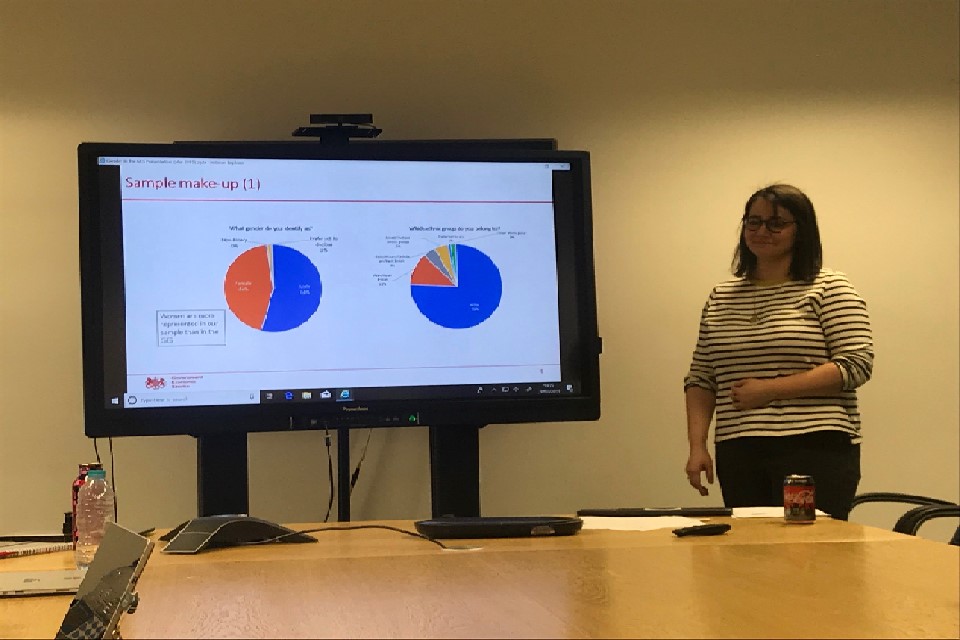
Alice Lazzati presents survey findings
Guest speaker Rebecca Holmes also discussed the results from the survey she conducted on A-level students’ views of economics. This can particularly contribute to our understanding of the roots of issues of female representation in economics.
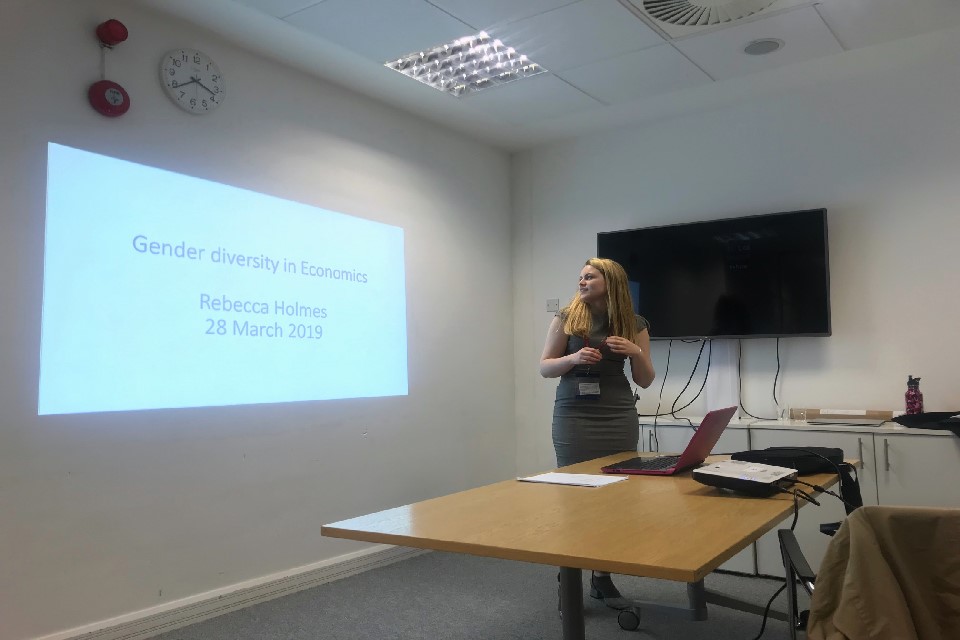
Guest speaker Rebecca Holmes
Rebecca is currently studying Economics, Geography and Textiles at A-levels at BHASVIC in Brighton and plans to study Economics and Politics at Manchester University next year. As a young woman in an early career stage, Rebecca decided to investigate the existence and key attributing factors (including occupational segregation) of the gender pay gap for an EPQ (extended project qualification). The research design used a survey of around 350 A-level students, across genders and studying a range of subjects, to look at how gendered careers may be cemented from a fairly young age. The survey focused on different areas including reasons for studying economics and how they related to gender; perspectives on the Bank of England; interest in economic careers; likelihood to participate in work experience and some other related areas.
Rebecca aims at developing the study into an academic paper over the summer. She previously presented the findings of her research to their Director of HR and Head of Outreach & Education at the Bank of and she looks forward to contributing to the Gender in the GES work and to sharing her findings with a pool of professional female economists.
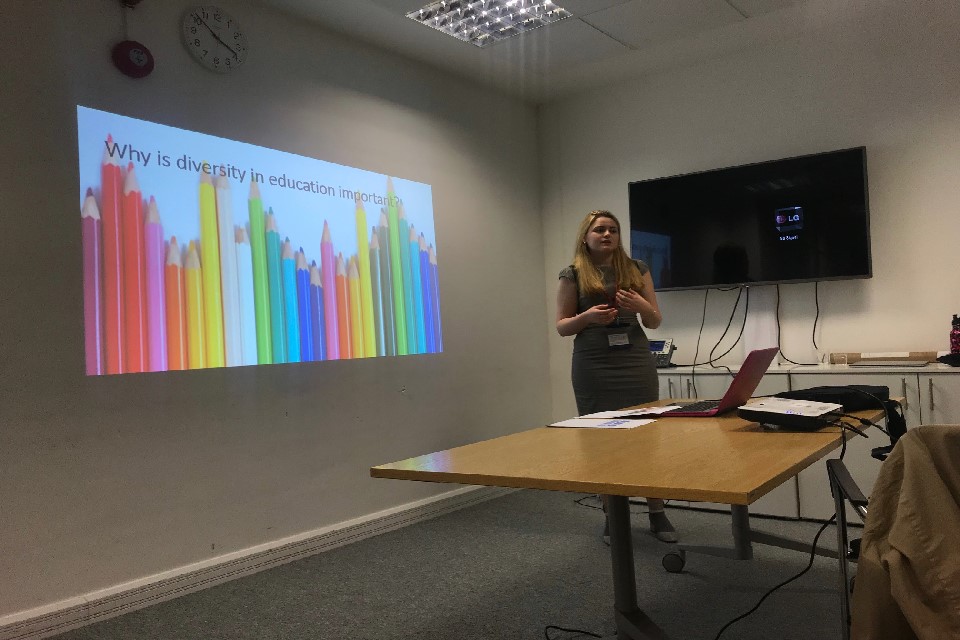
Rebecca Holmes presents her survey
1st Open Day Fair – Women in Economics – 16 November 2018
For the first time, we organised this year as special event to promote the GES as a career for women at the Department for Business Energy and Industrial Strategy. Students were able to engage directly with women from a range of backgrounds and at all levels of seniority in the GES.
The event started with an initial panel discussion showcasing different professional journeys and discussing the varied work GES economists do. This was followed by a Fair in which a number of Departments hosted a stand and provided one to one information. Students were able to find out about opportunities from many Departments. The Ministry of Justice, The Department for Work and Pensions, the Department of the Environment, Fisheries and Rural Affairs , the Office for National Statistics, the Department for International Trade, the Department for Education, the Department for Culture Media and Sports, Her Majesty’s Treasury, The Department for Transport, the Department of Health, the Department for Business Energy and Industrial Strategy and the Women in Economics Network were all represented.
We plan to run similar events next year and we will post them on this page!
The ‘Gender in GES’ initiative
The Gender in the GES initiative promotes diversity in economis. We aim to increase female participation in economics in government and academia.
With endorsement from the GES Board, the ‘Gender in the GES’ (GiG) initiative launched in January 2018. The focus of the initiative is to tackle the issue of gender diversity within the GES; however, we also care about the other protected characteristics. The focus is on 3 main objectives:
- Girls studying economics: increase the share of women applying to study economics at university
- GES market share - increase the share of female economists working in the GES, making the GES the employer of choice for female economists in the UK
- GES senior women/progression: increase the share of GES females in SCS positions
Gender in the GES (GiG) Initiative 18 Months Note
GiG Committee
Jenny Bates, Director, EU Exit and Economic Partnerships, Department for Business, Energy and Industrial Strategy (BEIS)
Jenny has been a member of the Government Economics Service (GES) since 2001 and is co-leading the GES initiative to improve the economic profession in Government.
Osama Rahman, Director of Analysis and Chief Scientific Adviser, Department for Education (DfE)
Before joining the DfE, Osama spent over 14 years at the Ministry of Justice (MoJ). He has been a member of GES since 2003 and is co-leading the GES initiative to improve the economics profession in Government.
Vanessa MacDougall, Director Economics and Deputy Chief Economic Adviser, HM Treasury (HMT)
Meet the GES GIG committee and our economists
Contact us
If you would like to actively volunteer to help us achieve our objectives, please get in touch. Please be aware this requires agreement from line managers and time commitment of one day a fortnight. Please email [email protected] to find out more.
Women in Economics Network
The Women in Economics (WE) Network is a rapidly growing GES-wide network which seeks to promote positive culture change. Established in 2018, the aim of the network is to provide support to female economists (Grade 7 and below) in the GES when establishing and developing their careers.
Over the course of the last year, WE has delivered events on a wide range of topics including “How to succeed through failure”, “What makes a good leader?” and “Modern Masculinity”. Through events such as a book clubs and coffee clubs, as well as our social events, the network has helped to develop a safe and healthy forum to discuss issues affecting women in economics.
Anyone in the Civil Service is welcome to attend events, although these will be designed to cover issues affecting lower grade female economists.
To find out more, or to be added to our mailing list, please email [email protected]
Social media
Please follow the GES social media accounts to keep up to date with relevant information.
Updates to this page
Published 2 January 2019Last updated 30 July 2020 + show all updates
-
details included of the Women in Economics Virtual Careers Fair on 27 August 2020
-
GiG 18 Months Note attached
-
Update on the 26 Sept, Careers Fair
-
Advert for Careers Fair for Women in Economics on 26 September 2019 added
-
details of mini conference on 3 July 2019 added
-
1st Open Day Fair in the North April 2019 added
-
Women in Economics Network details included
-
News update on survey findings and Rebecca Holmes presentation
-
'More information on the GES GiG committee' and the ‘Meet some of our economists’ combined to form ‘Meet the GES GIG committee and our economists’ attachment.
-
GES Social Media details added
-
New contact details [email protected] and [email protected]
-
New attachments "Gender in the GES stands" and "Best Practice" added.
-
First published.